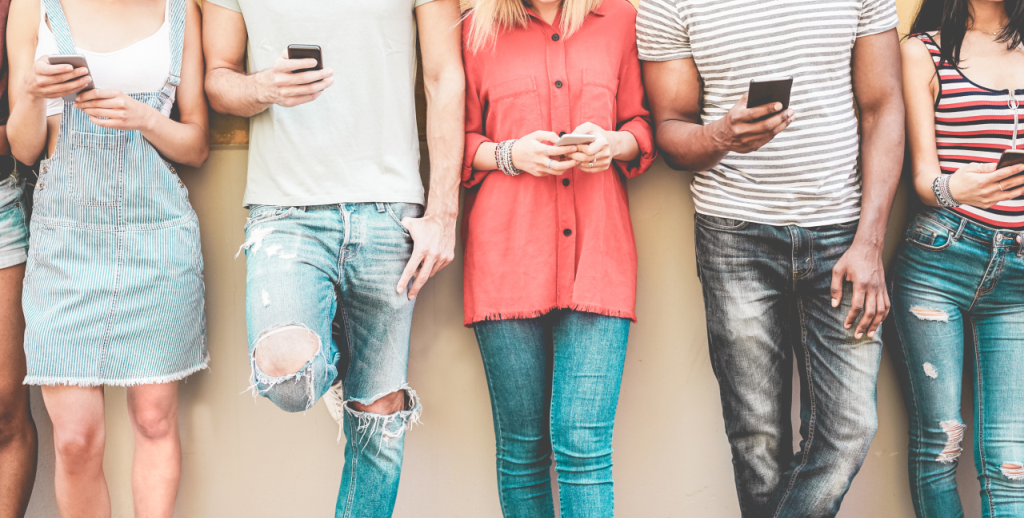We frequently stress the importance of raising awareness about mental health conditions such as depression, anxiety, disordered eating, and substance use disorders, and in recent years there has been a steady growth of social media content which seeks to discuss and provide support for mental health conditions and even to offer therapeutic advice. Certainly, those who struggle with these conditions benefit from support and visibility from others, and such types of online content are often a positive thing. However, what are the ethics surrounding mental health influencers online, and does this type of therapy content really offer long-term benefits to individuals who may be struggling with a mental health condition?
My previous blog looked at some of the ways in which social media influencers affect young viewers. Below, we will examine the pros and cons of how influencers are shaping the landscape of and support communities for mental health conditions in the modern era.
Celebrity Influencers and Mental Health
One of the most important things to consider when discussing how social media influencers engage with mental health is their credibility: many celebrity influencers have used social platforms to speak about their struggles with mental health conditions such as depression and anxiety. Zayn Malik, Justin Beiber, Willow Smith, and Bella Hadid have all used Instagram to post about their unique battles with depression and anxiety [1,2], and many celebrities from around the world have used social media to share their struggles with disordered eating. [3]
While the visibility these stars provide for mental health conditions can be a good thing for those who feel isolated or ashamed of their diagnoses as well as for people who would not otherwise be aware of how prevalent these mental health conditions are, celebrities are not trained experts. This social sharing of personal experiences online can be beneficial to show young people that they are not alone, but when it comes to getting reliable and useful information on mental health conditions, people need professional advice.
Fortunately, many celebrities who open up about their mental health challenges do not claim to be experts and often actually provide their fans with lists of the resources they themselves used to get help. Many celebrities who share their struggles with mental health conditions on social media also support and do visibility work for charities and organizations that work to educate and provide treatment for mental health conditions. In this respect, their advocacy work can ultimately be a great way to get others to seek information and resources for recovery.
Social Media Therapy
Another interesting aspect of social media content on mental health is the recent trend of mental health professionals using social media platforms to share advice and offer support to a wider population. These can include counselors and life coaches who create and share brief videos on how to experience better daily well-being, therapists who offer short pieces of advice on how best to navigate social anxiety and depression, or psychology researchers who share their findings on mental health via social media platforms. A study conducted in 2022 found that both TikTok and Instagram hosted a number of accounts for mental health professionals, with over 100,000 followers.[4]
The fact that mental health influencers are becoming so prevalent online can be viewed as a good thing for individuals who are seeking help or clarity about how they are feeling or the mental health conditions with which they are struggling. However, the authors of the 2022 study analyzed five posts from certain mental health influencers and found that not all of the videos were reliable or credible. What’s more, while about half of the posts studied included disclaimers and crisis support information, only about 22% of the TikTok posts provided any useful information on mental health condition symptoms, treatments, or broader mental health literacy. On Instagram, that number was only about 7%. So, while there is some benefit to the visibility provided by mental health professionals acting as influencers, ultimately, the content being shared is more generic and less specific, so it is not a good replacement for therapy or other treatment.
While there is no denying that the increased visibility brought about by mental health-related content online means better general awareness concerning mental health conditions and that connecting to a health professional’s online platform or learning from celebrity’s experiences with mental health conditions are great ways to initiate support for a mental health condition, seeking treatment and recovery still require a great deal of one-to-one and group work, professional advice, and personal support from friends and family.
There’s no harm in finding connection and reassurance from mental health influencers, but it is not a replacement for treatment. To learn more about the treatment and support options we provide for a wide range of mental health conditions, go to the mental health section of our website. Our team is here to provide ethical and non-judgmental solutions to help you work toward long-term recovery.
Sources:
[1] Naftulin, J. (2022) 6 times celebrities spoke up about their mental health in 2022. https://www.insider.com/celebrities-who-spoke-up-about-their-mental-health-in-2022-2022-12#ryan-reynolds-said-hes-struggled-with-anxiety-for-most-of-his-life-1
[2] Bailey, A. (2023) Bella Hadid Opens Up About Her Mental Health Struggles and Journey: ‘It Feels Harder to Not Share my Truth.” https://www.elle.com/culture/celebrities/a38200644/bella-hadid-mental-health-journey-instagram/
[3] The Editors of Women’s Health. (2022) 22 Celebs Who Have Opened Up About Their Experiences With Eating Disorders. https://www.womenshealthmag.com/uk/food/healthy-eating/g39278360/celebs-eating-disorders/
[4] Pretorius, C., McCashin, D., & Coyle, D. (2022). Mental health professionals as influencers on TikTok and Instagram: What role do they play in mental health literacy and help-seeking? Internet Interventions, 30, 100591. https://doi.org/10.1016/j.invent.2022.100591


